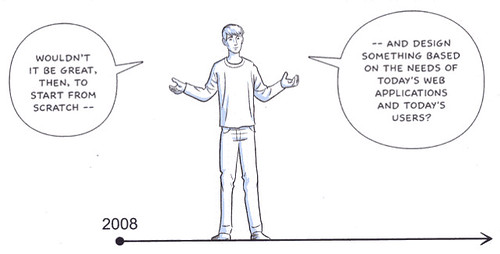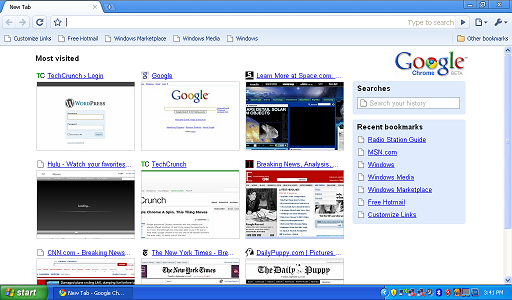A few weeks ago Google release a product called Chrome which is their own web browser. Only it is really so much more. At first it doesn’t look like much – and it isn’t, just yet. However it’s the direction Chrome is going and the intent behind the release that matters. Google doesn’t want a competitor to IE or Firefox, they want a new OS – a web OS that competes and beats Microsoft Windows.
Chris Messina who worked both a Mozilla and Flock – both browser companies – has a great post about how Chrome came to be and what it means (post is here). Chrome is the future of browsers. It’s one that embraces web applications and has Gears, an engine that enhances the internal code of apps to make them more powerful and quick.

On interesting piece of the post is pointing out WHO is working on Chrome. He paints Google as cohesive team of folks in the pennisula who are laser focused on delivering a next generation browser:
Google is a well-oiled, well-heeled machine. The Webkit team, as a rhizomatic offshoot from Apple, has a similar development pedigree and has consistently produced a high quality — now cross-platform — open source project, nary engaging in polemics or politics. They let the results speak for themselves. They keep their eyes on the ball.
Ultimately this has everything to do with people; with leadership, execution and vision.
When Mozilla lost Ben Goodger I think the damage went deeper than was known or understood. Then Blake Ross and Joe Hewitt went over to Facebook, where they’re probably in the bowels of the organization, doing stuff with FBML and the like, bringing Parakeet into existence (they’ve recently been joined by Mike Schroepfer, previously VP of Engineering at Mozilla). Brad Neuberg joined Google to take Dojo Offline forward in the Gears project (along with efforts from Dylan Schiemann and Alex Russell). And the list goes on.
A few more points he expands in the original and subsequent post:
- One unique feature of Chrome is that it auto-updates without any notifications (with obvious security issues). Chris writes: “if you’ve read the fine-print closely, you already know that this means that Chrome will be a self-updating, self-healing browser….. by using Chrome, you agree to allow Google to update the browser. That’s it: end of story. You want to turn it off? Disconnect from the web… in the process, rendering Chrome nothing more than, well, chrome (pun intended).”
- Another interesting point of note is that Google evolved the UI of the browser and “went ahead and combined the search box and the location field in Chrome and is now pushing the location bar as the starting place, as well as where to do your searching” This is interesting as it was a logical trend that no browser has yet picked up on

![Reblog this post [with Zemanta]](http://img.zemanta.com/reblog_e.png?x-id=81161139-c93e-4c6a-ab58-293cca07439a)
![Reblog this post [with Zemanta]](http://img.zemanta.com/reblog_e.png?x-id=78d47fbc-5602-47fe-849b-87cc933586d0)


![Reblog this post [with Zemanta]](http://img.zemanta.com/reblog_e.png?x-id=7bb68b0f-d270-4f70-a504-62912f91c944)

![Reblog this post [with Zemanta]](http://img.zemanta.com/reblog_e.png?x-id=96452e70-07bd-4e44-87c8-f1e630f9582c)

![Reblog this post [with Zemanta]](http://img.zemanta.com/reblog_e.png?x-id=b6dcf91b-5c3f-4737-8a4a-675161deeec5)



![Reblog this post [with Zemanta]](http://img.zemanta.com/reblog_e.png?x-id=e32498a2-40a8-48b4-8ce2-042d5204e85a)

![Reblog this post [with Zemanta]](http://img.zemanta.com/reblog_e.png?x-id=0527655a-47c5-42ee-ae5b-b87bce1da423)

